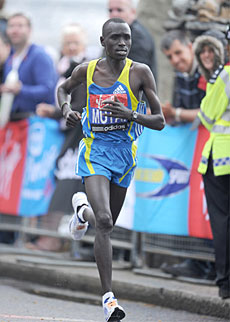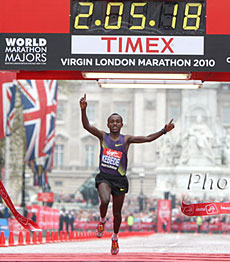Coverage Homepage
Post Race: Men's Race and Commentary |
Women's Race and Commentary (in process) | Complete Searchable Results
Pre-Race:
London Marathon Preview |
Elite Athlete Past Matchups
| Prize Money & Starter List
Athlete Bios:
Men's Race - Top Competitors |
Women's Race - Top Competitors
Interesting Extras:
Athlete/Course Videos |
Course Map
Other News Sources: Press Releases |
General Press
London Marathon - The Men's Race
by Sharon Ekstrom
The 30th Anniversary of the London Marathon was the start of a new decade for the race as it brought in a new sponsor - Virgin; boasted the largest number of participants ever - over 36,500; and pulled together an incredibly deep field of men to chase the world record. That last point was not necessarily something unique to the 2010 race, but the depth of the field was superb, bringing together a mix of veteran athletes together with many of the fastest young upstarts who had been starting their careers with incredibly fast times and promise of more.
You Can't Beat Mother Nature
With all of the great planning of race organizers, there was one force that could undo their work: Mother Nature. The story of the 2010 London Marathon will always be told with the story of the volcano in Iceland, the closing of European airspace and the travails that the athletes had to undergo to make it to the starting line. The marathon took matters into its hands and £175,000 taken from the event's contingency fund, organizers chartered planes to get the top athletes to England.
The fates seemed to stir up more trouble as pre-race weather forecasts predicted one of the warmest London Marathon ever - sunny in the 70s and high in humidity. Fortunately, race day saw heavy bursts of rain just prior to the elite women's start, which cooled the air to a reasonable temperature: low 50s (52 degrees F), much more manageable for all participants, although the air remained very humid - not ideal for world record attempts.
The Men's Race
Gathered for the London Marathon was oneof the most amazing men's fields ever assembled including 19 men who had previously run a sub 2:06 marathon time - with the hope that many or all of these men might better their times on the fast London course - especially considering the incredible time bonus money that is always on the line at London. If these men were going to run their fastest, they would be compensated.
While we hoped for the best, we often forget that "anything can happen in a marathon" - and anyone who makes strong predictions will most likely be wrong... Nonetheless, expectations were high considering the London Marathon's roster which included Sammy Wanjiru, defending champion, course record holder and gold medalist from the Beijing Olympics; Duncan Kibet, the second fastest man in the world whose win at Rotterdam in 2:04:27 was a show of faith that records will continue to fall; Abel Kirui, 2009 World Champion in the marathon; and Zersenay Tadesse, half marathon world record holder who ran 58:23 at the Lisbon Half in preparation for London. The spotlight was on this group of runners and we expected something big: a world record, at least a course record and certainly some incredibly fast times as all these men would fight for the finish. As with any race for speed, the plan would be for these men to work together tothe 35K mark then battle it out for the finish. We knew that these featured four men would make up the bulk of the top finisher spots - but as strongly as we knew that, we were just as strongly wrong.
Pacesetting in 2009
Sammy Wanjiru said it before the 2009 London Marathon: a world record would be dependent on the pacers helping to get him there. Pacesetters are paid athletes hired to get the runners through at least 30-35K of the distance in the most even tempo. Some races know they won't set world records and are let the runners do as they wish in a strategic battle. But the races that focus on speed - such as London - rely on pacesetters. In 2009, three pacemakers were instructed to take Wanjiru and front runners including Kebede and Gharib on world record pace and perhaps they were too fast as Wanjiru went through the halfway mark in 2009 in 61:35 - the fastest half marathon ever run in a marathon, but the pacers were not able to stay with Wanjiru and without the support he seemed to fade thereafter although he managed to hold on enough for a course record. through the half split in the fastest half ever run in a marathon (61:35).
Pacesetting in 2010
The London Marathon organizers hired five pacemakers to go out at a projected 2:04 finish - striking distance to the world record of 2:03:59 set by Haile Gebrselassie at the 2008 Berlin Marathon. The five pacemakers formed a windshield from the start as the top men set out - and we'll note again that two of the fastest runners - Duncan Kibet and Abel Kirui - had previously been pacesetters themselves on world record attempts, by Haile Gebrselassie at Berlin and Dubai. The pacers would need to average a 4:44-4:46 pace per mile to achieve the desired time. But they didn't...
As the runners started, the lead pack consisted of marathoners consisted of all of the favorites and more: Wanjiru, Kirui, Kibet, Tsegaye Kebede, Jaouad Gharib, Zersenay Tadesse, Yonas Kifle, Emmanuel Mutai, Abderrahim Bouramdane, Marilson Gomes dos Santos, Takayuki Matsumiya and Satoshi Irifune. The pack hit the first 5K mark at 14:39, 10k at 29:41, 15K at 44:51, and 20K at 59:53... Perfect pacing would have put the men through those marks at 14:42, 29:23, 44:05 and 58:46. By 20K, the men were more than a minute slower than they should have been. Wanjiru seemed to recognize this and ran alongside the pacers - seeming to tell them to speed up, but it was too late. The runners did increase the pace somewhat, but crossing the halfway mark in 1:03:06, the math was obvious. Two times 1:03:06 will not equal 2:04:00 and running that much of a negative split in a marathon at that pace is not possible. Was it the humidity? Was it the pacers? Regardless, there was not record to be set in 2010.

photo credit: Victah Sailah / PhotoRun | Expect the Unexpected
At the 25K mark, the four runners we had been talking about for weeks - our favorites - began to fade. Yonas Kifle - an upcoming Eritrean, Sammy Wanjiru and Duncan Kibet were the first to fall back, just after the halfway mark and Wanjiru - the defending champion and course record holder - would soon drop out. Tadesse who is faster in the half marathon than anyone else in the world, including former half marathon record holder Wanjiru, was next to drop back.
At mile 17, Kirui and Kebede made a move at - and we knew there was a race as Kirui was one of the faster runners in the field and had proven himself with the win at the World Championships. Kebede, of course, was the 2009 runner-up and if raw speed and recent history were indicators, then the 2010 marathon was set to be a repeat of 2009 with Kirui taking the role of Wanjiru in beating Kebede to the finish line.
By mile 21, Kebede and Kirui were more than 30 seconds ahead of Emmanuel Mutai who ran alone in third place more than 20 seconds ahead of the other remaining men who were strung out behind. But then Kirui started to fade badly - and this final favorite to stay in the race would fade back to fifth place.
At mile 23 Kebede picked up the pace - despite running alone with no competition. He was running strong and by 40K the Ethiopian realized the victory would be his and he smiled and acknowledges the crowd. In the final stretch Kebede seemed to snap out of his daydream, took note of the clock and picked up the pace to the finish winning the race IN 2:05:19. Kebede's time was one second off his personal best, but one second better than his runner-up time at the 2009 London Marathon. With his win, Kebede ended the six year streak of Kenyan victories becoming the second Ethiopian man to win the race. Emmanuel mutai ran alone to a strong second place finish in 2:06:23, while Jaouad Gharib took the third spot in 2:06:55 for the second year in a row. Interestingly, with all of the hype on some newer runners to London and on Wanjiru, the men who captured the first three spots were the three men who finished just behind Wanjiru in 2009 - the predictable strong runners ran just as they should and could.
As an aside, the 2010 London Marathon was a banner day for the male UK marathoners with an extremely strong result of six men finishing in the top 15.

photo credit: Victah Sailah / PhotoRun |
Top Finishers
(position + time bonus + UK bonus)
1 Tsegaye Kebede (ETH) 2:05:19 $55,000 + 75,000
2 Emmanuel Mutai (KEN) 2:06:23 $30,000 + 50,000
3 Jaouad Gharib (MAR) 2:06:55 $22,000 + 50,000
4 Abderrahime Bouramdane (MAR) 2:07:33 $15,000 + 25,000
5 Abel Kirui (KEN) 2:08:04 $10,000 + 15,000
6 Marilson Gomes dos Santos (BRA) 2:08:46 $7,500 + 10,000
7 Zersenay Tadese (ERI) 2:12:03 $5,000
8 Andrew Lemoncello (GBR) 2:13:40 $4,000 + 2,500
9 Yonas Kifle (ERI) 2:14:39 $3,000
10 Andi Jones (GBR) 2:16:38 $2,000
11 Ben Moreau (GBR) 2:16:46 $1,500
12 Lee Merrien (GBR) 2:16:48 $1,000
|






